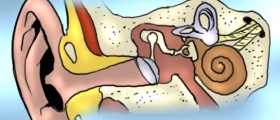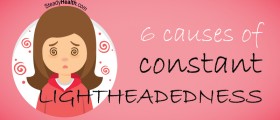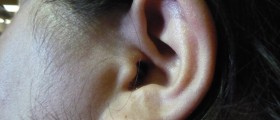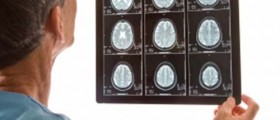Why is Your Head Spinning?
There are occasions when some of us experience a type of dizziness that manifests through having a sensation like your head is "spinning", or perhaps more accurately, everything in the world around you is spinning. This head spinning can overcome you while you are walking, lying down, sitting, or standing up, regardless of what you are doing.
This phenomenon is called vertigo. Vertigo, or feeling like your head is spinning, has many different causes and several specific manifestations and side-effects which might take place along while you are feeling dizzy.

Manifestations of Head Spinning Sensation
The spinning sensation is itself the basic effect or symptom of this phenomenon, but it's not the only symptom you may notice. Some people will feel like they're being pushed to the side, or may even completely lose their balance and fall over once they are affected by vertigo, having a need to lie down or sit, due to the feeling that they might faint or pass out.
Additionally, lightheadedness is an effect that may occur before, during, and after the head spinning attack. Fatigue may be present as well, along with a feeling of general weakness. The symptoms tend to get worse if you try to move your head rapidly. During this action, you might suffer from blurred vision too. Finally, nausea, possible heavy sweating, and concentration difficulties are common when you have an attack of vertigo.
Reasons Behind the Head Spinning Sensation: Why Do You Get Vertigo?
Our center of balance is located inside our inner ear. There, we have nerves which deliver signals to our brain, establishing balance and helping us orientate in terms of place. Once we move our head, change our direction or our balance, these nerves, in correspondence with the brain, enabling us to move and react properly to any changes in the environment.
Unfortunately, several conditions and situations may cause problems in this “network”, leading to the head spinning sensation and, thereby, loss of balance.
Inner ear inflammation, usually due to viral activities, is one of the most common causes of vertigo. An inner ear inflammation may last for several days, after which no spinning head sensations are to be felt. Alternatively, sometimes, due to migraines which may trigger your hormonal imbalances, you might feel nauseous, sick and experience a head spinning condition as well.
As we grow older, the calcium crystal concentration in our inner ear get overwhelming, affecting our balance, and again potentially causing the symptoms of spinning head sensation. This condition is medically called paroxysmal positional vertigo, and it is closely linked with older age. Besides aging, a direct injury to the head or ear may result in the problem of vertigo too.
Also, one of possible causes may be a non-cancerous growth on one of the nerves involved in the balance control of our body. Then, we are bound to experience buzzing sounds in our ears, feel lightheaded, and experience the spinning sensation in our head.
Too much fluids in your ears may cause most of the symptoms mentioned above, affecting you the same way. Finally, there might be a more serious, underlying disease causing your problems. Therefore, if you often experience head spinning sensation, and have frequent or persistent problems with vertigo, seek medical attention.
In many cases, vertigo will go away on its own — and no true cause is ever discovered. In other cases, however, physical therapy or medications may help you overcome this problem, while rare cases even require surgery.
- Sit or lie down. Stop what you’re doing and lie down. You can also sit on a chair with your head positioned between your knees. While this last method is beneficial for dizziness, it may make vertigo worse, so be sure to take it slow.
- Move carefully. Dizziness or vertigo can lead to falls. If you must move around, do so slowly and carefully. Use support in the form of a walking stick or cane, if possible.
- Hydrate. Dehydration can make your symptoms worse, so try to drink some water as you recover.
- Avoid some activities. Don’t drive or operate other types of heavy machinery until your symptoms have passed.
- Rest up. Getting a good amount of rest may help ease your symptoms, particularly if they’re due to an infection.

















Your thoughts on this
Loading...